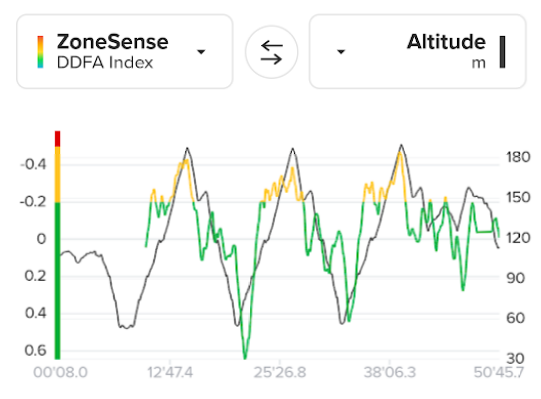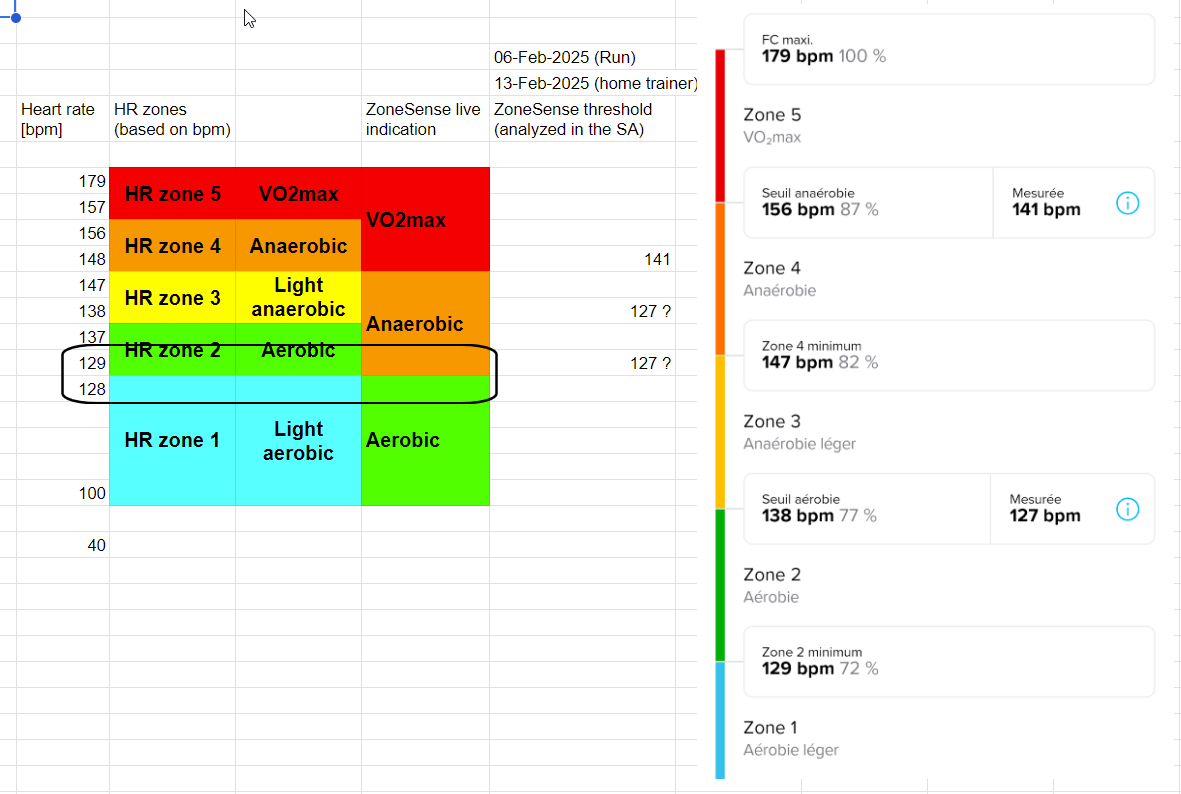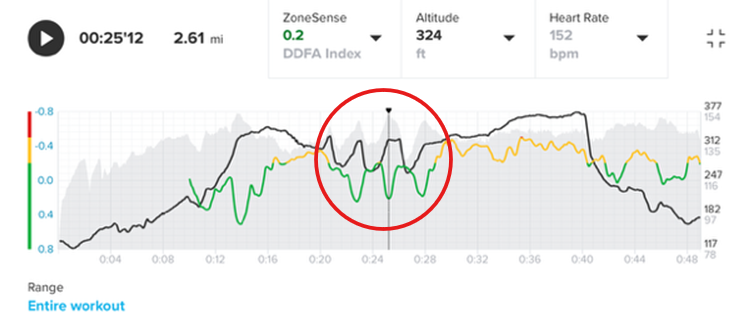Suunto ZoneSense
-
@AntoniusGaius yes, that’s totally fair

I would wait a bit to see if next updates do correct it. You are not the only one that has been reporting this problem so hopefully addressed soon
-
I did several runs and rowing sessions with my suunto watch.
I have observed the following:
As suunto communicates, Zonesense needs the transitions between the different zones in the workout.
Most of the time, when I didn’t get any threshold data, the measurements of my HRV data from the chest strap were very fragmented. I think this is where Zonesense on the watch works less sensitively and uses this bad data and the app then filters it out. This is just an observation, but if I have a relatively clean history of HRV data via runalyze, Zonesense fits quite well.
For example, I had a run yesterday and tried to get into vo2max at the end. I reached the threshold on the watch, Zonesense was in the red zone, fell relatively quickly into the green zone and in the app it didn’t show me any threshold values. The analysis with runalyze then actually showed that the HRV data was simply bad towards the end. I understand that Zonesense needs good HRV readings - if they don’t come or come incorrectly, then the system can’t work.
Suunto should somehow evaluate the quality of the HRV data on the watch / app, so that the user has the possibility to recognize why zonesense does not provide valid data (Attention: Zonesense cannot be displayed because the HRV question segmentation is too high).I will continue to monitor this. I have now used my chest strap with ECG gel. In the cold, this seems to have helped to maintain more constant HRV data.
-
An article in German language, Google translator will do the job for you…

-
Since now my experience with Suunto ZoneSense isn’t super conclusive…
First time today that it slowly begins to be relevant. Today’s training was 3 times a 130m elevation uphill. ZoneSense gave me anaerobic effort for last part of each hill.
To follow and check if it has finally calibrate to my zones and trainings…
-
I am interested in integrating ZS in my training plans for marathon and triathlon. I have been looking at my ZS data and comparing them with my HR data, focusing on the HR zone 2.
I understand ZS is supposed to be a better indicator than the HR values but I am in struggling when it comes to use ZS instead of the HR zone 2.My question is : I am supposed to train in my HR zone 2, what ZS area I am supposed to target ?
I would say the top of the ZS aerobic but this does not quite match (see picture); my HR zone 2 starts when the anaerobic area of ZS just kicks in.
Should I adjust my HR threshold?
See here a comparison of several trainings, data are stable over time

-
@flo7z How many estimates from SA did you take into consideration? I have been using it consistently, and when a threshold is reported, it can fluctuate from 125 to 155 for me.
Other question: how have you estimated your HR zones? There are countless methods available and probably not a single one is really accurate, also defining “accurate” is difficult since your threshold is not the same every day.
After doing mostly aerobic runs since ZS was released and seeing quite different results, I learned to trust my breathing effort more than everything else, if it’s easy then I push a little more even if ZS takes me to the yellow zone. This is highly subjective though. -
Regarding the threshold reported by ZS in SA which is very random - most of my activities don’t show it, some do - something even more confusing that I only now noticed is that I see the value on my mobile app and not on my Mac app, or the other way around, for the same activity.
-
I have stated this before and it is clearly presented in the Suunto videos. ZS is not a tool to set HR values. ZS is a tool to assess efforts for longer intervals and during exercise replacing HR values.
For training ultras where a mix of speed work, tempo and steady-state intervals are done, the general agreement is that HR is a poor indicator of effort. Running on trails presents difficulties not encountered on pavement that include rocks, sand, roots, mud, snow, ice and massive variations in grade accompanied by rocks, roots, sand, mud, snow, ice. For gauging effort in training most individuals use RPE and breathing tests. For short intervals (anything less than about 6 min for me) I don’t pay attention to ZS but anything longer I do knowing that ZS is not instantaneous.
On a Steady State interval of 30 min, which I have today I will keep ZS in the yellow as much as possible, which typically aligns well with my breathing test (on steady state I can say a short sentence or two).
A lot of comments here are too concerned with HR zones and I think for training you can focus on either but not both. (I rarely paid attention to my zones anyway but now I wish all I had for the outer ring was ZS.) Too many comments here are asking about adjusting HR zones with ZS, which I see as meaningless. ZS is most useful in real time, assessing how ZS sets your zones will depend on your recovery, your stress levels, probably food intake and likely others. As @Francesco-Pagano reported I see huge fluctuations in my AT from 120 to 145bpm. It will be interesting to see fluctuations in my LT as I soon have a block of intense intervals coming up. I do not adjust my HR zones because I believe it doesn’t matter.
This is my experience and my opinion from using ZS since last summer and not the opinion of Suunto. -
@flo7z Your screenshot shows the 5 Zones model. As far as I know, Z1 and Z2 in this model are below the Aerobic threshold, which is green in Zonesense.
ZE and Z4 are above Aerobic but below Aerobic threshold. This is yellow in Zonesense.
Z5 is above the Anaerobic threshold. Red in Zonesense.
I never trained for a marathon but I suspect that it should mostly be aerobic. So green in Zonesense.
As @Brad_Olwin stated: Zones and Zonesense are not the same. Use what helps you most.
I can also confirm that the thresholds reported by Zonesense do vary. Across different sports and even across different days.
For example in indoor rowing my Aerobic Threshold is at around 150, while in commuting by bike it is at around 136.
-
That’s exactly my point, it seems there is a big difference between the HR and ZS zones.
I understand you cannot directly compare HR and ZS but at the end of the day, you want to know if you are in aerobic or anaerobic.
As I prepare marathons, I do big volumes and I have observed that difference on several runs and indoor biking sessions. -
@Brad_Olwin by running marathons i know my paces and HR zones by heart, and the terrain does not play a role in this case.
if we are not supposed to compare HR and ZS zones, then why is the SA doing it as on my screenshot? -
@flo7z You can compare, but assuming a correlation and immediately dismissing ZoneSense as ineffective is misguided. ZoneSense relies on HRV during activities to measure intensity and fatigue, and reducing it to just heart rate oversimplifies the multiple factors involved in its calculation. For example, after a good night’s sleep, the same pace and HR might indicate an aerobic effort, whereas after poor sleep, that same pace and HR could shift into anaerobic territory. This makes pace and HR unreliable—and for me, obsolete—when it comes to targeting training effectively.
A little perspective about the factors involved in ZoneSense calculations:
Heart Rate Variability (HRV) is influenced by several physiological, environmental, and behavioral factors:
-
Physiological and Biological Factors
• Autonomic Nervous System: The balance between the sympathetic (stress, action) and parasympathetic (rest, recovery) nervous systems is the primary regulator of HRV.
• Age: HRV naturally decreases with age.
• Sex: Women tend to have slightly higher HRV than men before menopause.
• Genetics: Some individuals naturally have higher or lower HRV.
• Physical Fitness: Better cardiovascular fitness is generally associated with higher HRV. -
Lifestyle Factors
• Physical Exercise: Regular training improves HRV in the long term, but intense exercise can temporarily lower it.
• Sleep: Poor sleep quality or insufficient sleep reduces HRV.
• Hydration: Dehydration can lower HRV.
• Diet: A balanced diet low in inflammatory foods supports better HRV. -
Environmental Factors
• Temperature and Altitude: Extreme cold and high altitude can affect HRV.
• Air Quality and Pollution: Exposure to toxins or poor air quality can lower HRV. -
Psychological and Emotional Factors
• Stress and Anxiety: Chronic stress reduces HRV by increasing sympathetic nervous system activation.
• Relaxation and Meditation: These practices enhance HRV by activating the parasympathetic nervous system. -
Medical and Hormonal Factors
• Chronic Diseases: Conditions like hypertension, diabetes, and heart disease reduce HRV.
• Inflammation: Chronic inflammation is associated with lower HRV.
• Hormonal Fluctuations: Cortisol (stress hormone) lowers HRV, while melatonin and testosterone may increase it.
• Substance Use: Caffeine, alcohol, nicotine, and certain medications can alter HRV. -
Circadian and Temporal Factors
• Time of Day: HRV is typically higher at night due to parasympathetic dominance.
• Circadian Rhythms: Jet lag and disruptions to biological rhythms affect HRV.
-
-
I’ve been using ZoneSense since it’s release on my race.
I love the idea of it & really want to base all my training around it but continuously see random stuff like this going on.
Is this just highlighting the interval “limitations” discussed above or something else going on ?

Cheers
Matt -
@flo7z said in Suunto ZoneSense:
@Brad_Olwin by running marathons i know my paces and HR zones by heart, and the terrain does not play a role in this case.
if we are not supposed to compare HR and ZS zones, then why is the SA doing it as on my screenshot?Your HR zones are going to change daily as judged by ZS. That at is the point.
-
@Mattg576 how long are the intervals? Likely too short. I would not use ZS for any less than 6 min and even then ZS will have a 1 to 2 min delay.
-
@Brad_Olwin
They’re not intervals Brad, just some small hills on a tempo run. -
@Mattg576 How long? Looks too short as the downhills push ZS low and not enough sustained effort to go higher. On trails I cannot run downhill fast enough for ZS to show actual effort. That’s why I rely on RPE as well.
-
@Brad_Olwin @Mattg576 to extend on that, in the ZoneSense videos it is said that you don’t want to look at the actual curve of ZoneSense but only on the color. So, a downvard curve within green means nothing, it is just green…
-
@Brad_Olwin I don’t know what you mean by how long or looks too short, the whole run or the small hills ?
-
@2b2bff I understand the principles of Zonesense but by that logic my work effort got easier while I ran those hills (which it didn’t, it got harder).
I also understand there isn’t a direct correlation between ZS & HR BUT surely as the work effort increases it would push you up further into the anaerobic state - not nose dive back into low aerobic…